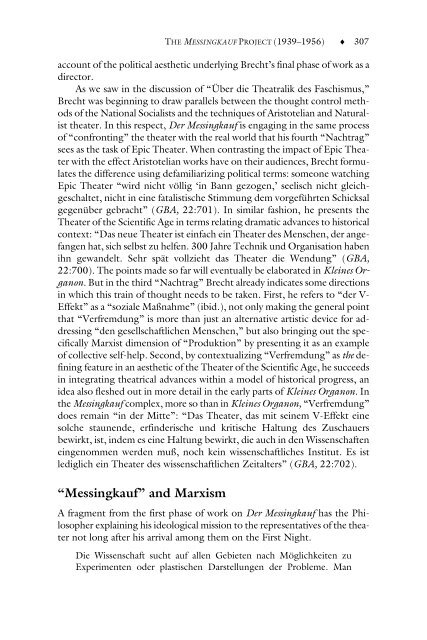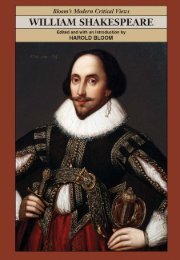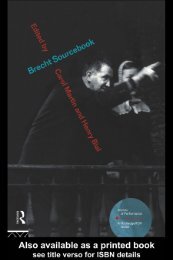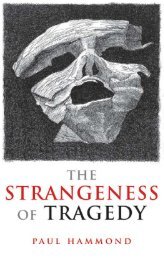- Page 2 and 3:
Bertolt Brecht’s Dramatic Theory
- Page 4 and 5:
Bertolt Brecht’s Dramatic Theory
- Page 6:
Contents Acknowledgments vii Abbrev
- Page 9 and 10:
viii ♦ ACKNOWLEDGMENTS to Sue Inn
- Page 12 and 13:
Introduction T HE PRESENT STUDY OFF
- Page 14 and 15:
INTRODUCTION ♦ 3 equivalent of a
- Page 16 and 17:
INTRODUCTION ♦ 5 into print. For
- Page 18 and 19:
INTRODUCTION ♦ 7 throughout the e
- Page 20 and 21:
INTRODUCTION ♦ 9 tically producti
- Page 22 and 23:
INTRODUCTION ♦ 11 schenoper “ei
- Page 24 and 25:
INTRODUCTION ♦ 13 If the image of
- Page 26 and 27:
INTRODUCTION ♦ 15 Bentley’s ble
- Page 28 and 29:
INTRODUCTION ♦ 17 im strengen Sin
- Page 30 and 31:
INTRODUCTION ♦ 19 Ästhetik für
- Page 32 and 33:
INTRODUCTION ♦ 21 unserer Spielwe
- Page 34 and 35:
INTRODUCTION ♦ 23 about the theor
- Page 36 and 37:
INTRODUCTION ♦ 25 Some preliminar
- Page 38 and 39:
EPIC OPERA AND EPIC THEATER ♦ 27
- Page 40 and 41:
EPIC OPERA AND EPIC THEATER ♦ 29
- Page 42 and 43:
EPIC OPERA AND EPIC THEATER ♦ 31
- Page 44 and 45:
EPIC OPERA AND EPIC THEATER ♦ 33
- Page 46 and 47:
EPIC OPERA AND EPIC THEATER ♦ 35
- Page 48 and 49:
EPIC OPERA AND EPIC THEATER ♦ 37
- Page 50 and 51:
EPIC OPERA AND EPIC THEATER ♦ 39
- Page 52 and 53:
EPIC OPERA AND EPIC THEATER ♦ 41
- Page 54 and 55:
EPIC OPERA AND EPIC THEATER ♦ 43
- Page 56 and 57:
EPIC OPERA AND EPIC THEATER ♦ 45
- Page 58 and 59:
EPIC OPERA AND EPIC THEATER ♦ 47
- Page 60 and 61:
EPIC OPERA AND EPIC THEATER ♦ 49
- Page 62 and 63:
EPIC OPERA AND EPIC THEATER ♦ 51
- Page 64 and 65:
EPIC OPERA AND EPIC THEATER ♦ 53
- Page 66 and 67:
EPIC OPERA AND EPIC THEATER ♦ 55
- Page 68 and 69:
EPIC OPERA AND EPIC THEATER ♦ 57
- Page 70 and 71:
EPIC OPERA AND EPIC THEATER ♦ 59
- Page 72 and 73:
EPIC OPERA AND EPIC THEATER ♦ 61
- Page 74 and 75:
EPIC OPERA AND EPIC THEATER ♦ 63
- Page 76 and 77:
EPIC OPERA AND EPIC THEATER ♦ 65
- Page 78 and 79:
Zwei Schemata EPIC OPERA AND EPIC T
- Page 80 and 81:
EPIC OPERA AND EPIC THEATER ♦ 69
- Page 82 and 83:
EPIC OPERA AND EPIC THEATER ♦ 71
- Page 84 and 85:
EPIC OPERA AND EPIC THEATER ♦ 73
- Page 86 and 87:
EPIC OPERA AND EPIC THEATER ♦ 75
- Page 88 and 89:
2: Conceptualizing the Exile Work:
- Page 90 and 91:
CONCEPTUALIZING THE EXILE WORK ♦
- Page 92 and 93:
CONCEPTUALIZING THE EXILE WORK ♦
- Page 94 and 95:
CONCEPTUALIZING THE EXILE WORK ♦
- Page 96 and 97:
CONCEPTUALIZING THE EXILE WORK ♦
- Page 98 and 99:
CONCEPTUALIZING THE EXILE WORK ♦
- Page 100 and 101:
CONCEPTUALIZING THE EXILE WORK ♦
- Page 102 and 103:
CONCEPTUALIZING THE EXILE WORK ♦
- Page 104 and 105:
CONCEPTUALIZING THE EXILE WORK ♦
- Page 106 and 107:
CONCEPTUALIZING THE EXILE WORK ♦
- Page 108 and 109:
CONCEPTUALIZING THE EXILE WORK ♦
- Page 110 and 111:
CONCEPTUALIZING THE EXILE WORK ♦
- Page 112 and 113:
CONCEPTUALIZING THE EXILE WORK ♦
- Page 114 and 115:
CONCEPTUALIZING THE EXILE WORK ♦
- Page 116 and 117:
CONCEPTUALIZING THE EXILE WORK ♦
- Page 118 and 119:
CONCEPTUALIZING THE EXILE WORK ♦
- Page 120 and 121:
CONCEPTUALIZING THE EXILE WORK ♦
- Page 122 and 123:
CONCEPTUALIZING THE EXILE WORK ♦
- Page 124 and 125:
CONCEPTUALIZING THE EXILE WORK ♦
- Page 126 and 127:
CONCEPTUALIZING THE EXILE WORK ♦
- Page 128 and 129:
CONCEPTUALIZING THE EXILE WORK ♦
- Page 130 and 131:
CONCEPTUALIZING THE EXILE WORK ♦
- Page 132 and 133:
CONCEPTUALIZING THE EXILE WORK ♦
- Page 134 and 135:
CONCEPTUALIZING THE EXILE WORK ♦
- Page 136 and 137:
CONCEPTUALIZING THE EXILE WORK ♦
- Page 138 and 139:
CONCEPTUALIZING THE EXILE WORK ♦
- Page 140 and 141:
CONCEPTUALIZING THE EXILE WORK ♦
- Page 142 and 143:
CONCEPTUALIZING THE EXILE WORK ♦
- Page 144 and 145:
THE DRAMATURGICAL POEMS AND THEIR C
- Page 146 and 147:
THE DRAMATURGICAL POEMS AND THEIR C
- Page 148 and 149:
THE DRAMATURGICAL POEMS AND THEIR C
- Page 150 and 151:
THE DRAMATURGICAL POEMS AND THEIR C
- Page 152 and 153:
THE DRAMATURGICAL POEMS AND THEIR C
- Page 154 and 155:
THE DRAMATURGICAL POEMS AND THEIR C
- Page 156 and 157:
THE DRAMATURGICAL POEMS AND THEIR C
- Page 158 and 159:
THE DRAMATURGICAL POEMS AND THEIR C
- Page 160 and 161:
THE DRAMATURGICAL POEMS AND THEIR C
- Page 162 and 163:
THE DRAMATURGICAL POEMS AND THEIR C
- Page 164 and 165:
THE DRAMATURGICAL POEMS AND THEIR C
- Page 166 and 167:
THE DRAMATURGICAL POEMS AND THEIR C
- Page 168 and 169:
THE DRAMATURGICAL POEMS AND THEIR C
- Page 170 and 171:
THE DRAMATURGICAL POEMS AND THEIR C
- Page 172 and 173:
THE DRAMATURGICAL POEMS AND THEIR C
- Page 174 and 175:
THE DRAMATURGICAL POEMS AND THEIR C
- Page 176 and 177:
THE DRAMATURGICAL POEMS AND THEIR C
- Page 178 and 179:
THE DRAMATURGICAL POEMS AND THEIR C
- Page 180 and 181:
THE DRAMATURGICAL POEMS AND THEIR C
- Page 182 and 183:
THE DRAMATURGICAL POEMS AND THEIR C
- Page 184 and 185:
THE DRAMATURGICAL POEMS AND THEIR C
- Page 186 and 187:
THE DRAMATURGICAL POEMS AND THEIR C
- Page 188 and 189:
THE DRAMATURGICAL POEMS AND THEIR C
- Page 190 and 191:
THE DRAMATURGICAL POEMS AND THEIR C
- Page 192 and 193:
4: Preparations for East Berlin: Kl
- Page 194 and 195:
PREPARATIONS FOR EAST BERLIN ♦ 18
- Page 196 and 197:
PREPARATIONS FOR EAST BERLIN ♦ 18
- Page 198 and 199:
PREPARATIONS FOR EAST BERLIN ♦ 18
- Page 200 and 201:
PREPARATIONS FOR EAST BERLIN ♦ 18
- Page 202 and 203:
PREPARATIONS FOR EAST BERLIN ♦ 19
- Page 204 and 205:
PREPARATIONS FOR EAST BERLIN ♦ 19
- Page 206 and 207:
PREPARATIONS FOR EAST BERLIN ♦ 19
- Page 208 and 209:
PREPARATIONS FOR EAST BERLIN ♦ 19
- Page 210 and 211:
PREPARATIONS FOR EAST BERLIN ♦ 19
- Page 212 and 213:
PREPARATIONS FOR EAST BERLIN ♦ 20
- Page 214 and 215:
PREPARATIONS FOR EAST BERLIN ♦ 20
- Page 216 and 217:
PREPARATIONS FOR EAST BERLIN ♦ 20
- Page 218 and 219:
PREPARATIONS FOR EAST BERLIN ♦ 20
- Page 220 and 221:
PREPARATIONS FOR EAST BERLIN ♦ 20
- Page 222 and 223:
PREPARATIONS FOR EAST BERLIN ♦ 21
- Page 224 and 225:
PREPARATIONS FOR EAST BERLIN ♦ 21
- Page 226 and 227:
PREPARATIONS FOR EAST BERLIN ♦ 21
- Page 228 and 229:
PREPARATIONS FOR EAST BERLIN ♦ 21
- Page 230 and 231:
PREPARATIONS FOR EAST BERLIN ♦ 21
- Page 232 and 233:
PREPARATIONS FOR EAST BERLIN ♦ 22
- Page 234 and 235:
PREPARATIONS FOR EAST BERLIN ♦ 22
- Page 236 and 237:
PREPARATIONS FOR EAST BERLIN ♦ 22
- Page 238 and 239:
PREPARATIONS FOR EAST BERLIN ♦ 22
- Page 240 and 241:
PREPARATIONS FOR EAST BERLIN ♦ 22
- Page 242 and 243:
PREPARATIONS FOR EAST BERLIN ♦ 23
- Page 244 and 245:
PREPARATIONS FOR EAST BERLIN ♦ 23
- Page 246 and 247:
PREPARATIONS FOR EAST BERLIN ♦ 23
- Page 248 and 249:
PREPARATIONS FOR EAST BERLIN ♦ 23
- Page 250 and 251:
THE MESSINGKAUF PROJECT (1939-1956)
- Page 252 and 253:
THE MESSINGKAUF PROJECT (1939-1956)
- Page 254 and 255:
THE MESSINGKAUF PROJECT (1939-1956)
- Page 256 and 257:
THE MESSINGKAUF PROJECT (1939-1956)
- Page 258 and 259:
THE MESSINGKAUF PROJECT (1939-1956)
- Page 260 and 261:
THE MESSINGKAUF PROJECT (1939-1956)
- Page 262 and 263:
THE MESSINGKAUF PROJECT (1939-1956)
- Page 264 and 265:
THE MESSINGKAUF PROJECT (1939-1956)
- Page 266 and 267:
THE MESSINGKAUF PROJECT (1939-1956)
- Page 268 and 269: THE MESSINGKAUF PROJECT (1939-1956)
- Page 270 and 271: THE MESSINGKAUF PROJECT (1939-1956)
- Page 272 and 273: THE MESSINGKAUF PROJECT (1939-1956)
- Page 274 and 275: THE MESSINGKAUF PROJECT (1939-1956)
- Page 276 and 277: THE MESSINGKAUF PROJECT (1939-1956)
- Page 278 and 279: THE MESSINGKAUF PROJECT (1939-1956)
- Page 280 and 281: THE MESSINGKAUF PROJECT (1939-1956)
- Page 282 and 283: THE MESSINGKAUF PROJECT (1939-1956)
- Page 284 and 285: THE MESSINGKAUF PROJECT (1939-1956)
- Page 286 and 287: THE MESSINGKAUF PROJECT (1939-1956)
- Page 288 and 289: THE MESSINGKAUF PROJECT (1939-1956)
- Page 290 and 291: THE MESSINGKAUF PROJECT (1939-1956)
- Page 292 and 293: THE MESSINGKAUF PROJECT (1939-1956)
- Page 294 and 295: THE MESSINGKAUF PROJECT (1939-1956)
- Page 296 and 297: THE MESSINGKAUF PROJECT (1939-1956)
- Page 298 and 299: THE MESSINGKAUF PROJECT (1939-1956)
- Page 300 and 301: THE MESSINGKAUF PROJECT (1939-1956)
- Page 302 and 303: THE MESSINGKAUF PROJECT (1939-1956)
- Page 304 and 305: THE MESSINGKAUF PROJECT (1939-1956)
- Page 306 and 307: THE MESSINGKAUF PROJECT (1939-1956)
- Page 308 and 309: THE MESSINGKAUF PROJECT (1939-1956)
- Page 310 and 311: THE MESSINGKAUF PROJECT (1939-1956)
- Page 312 and 313: THE MESSINGKAUF PROJECT (1939-1956)
- Page 314 and 315: THE MESSINGKAUF PROJECT (1939-1956)
- Page 316 and 317: THE MESSINGKAUF PROJECT (1939-1956)
- Page 320 and 321: THE MESSINGKAUF PROJECT (1939-1956)
- Page 322 and 323: THE MESSINGKAUF PROJECT (1939-1956)
- Page 324 and 325: Works Consulted Primary Literature:
- Page 326 and 327: WORKS CONSULTED ♦ 315 Bennett, Su
- Page 328 and 329: WORKS CONSULTED ♦ 317 Dial, Josep
- Page 330 and 331: WORKS CONSULTED ♦ 319 ———.
- Page 332 and 333: Jesse, Horst. 1996. Brecht in Berli
- Page 334 and 335: WORKS CONSULTED ♦ 323 Licher, Edm
- Page 336 and 337: WORKS CONSULTED ♦ 325 Müller, Jo
- Page 338 and 339: WORKS CONSULTED ♦ 327 ———.
- Page 340 and 341: WORKS CONSULTED ♦ 329 Sudakov, Il
- Page 342: WORKS CONSULTED ♦ 331 Wirth, Andr
- Page 345 and 346: 334 ♦ INDEX Bölsche, Wilhelm, wo
- Page 347 and 348: 336 ♦ INDEX Brecht, Bertolt, work
- Page 349 and 350: 338 ♦ INDEX Brecht, Bertolt, work
- Page 351 and 352: 340 ♦ INDEX Brecht, Bertolt, work
- Page 353 and 354: 342 ♦ INDEX Einstein, Albert, wor
- Page 355 and 356: 344 ♦ INDEX Jauß, Hans Robert, 1
- Page 357 and 358: 346 ♦ INDEX Olden, Rudolf, 289n O
- Page 359: 348 ♦ INDEX “Verfremdung,” 87





